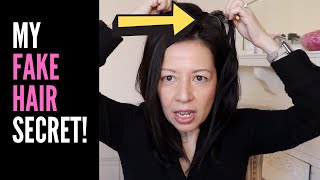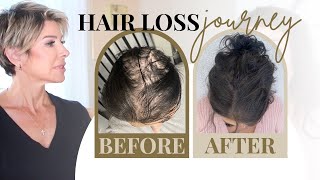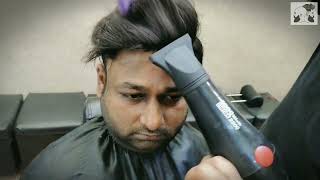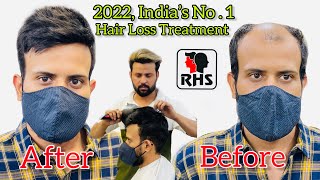Hair Loss Due to Weight Loss: Causes, Risks, and Prevention
- Posted on 29 September, 2021
- Hot Topic
- By SNY Admin
Both men and women go through periods of hair loss, especially as we age. In addition to the natural factor, some argue that weight loss also causes thinning hair. To understand the link between weight loss and hair loss, you first need to understand what causes hair loss to occur. Let’s find out with us!
Causes Of Hair Loss
Genetic
You’ve probably heard about male pattern baldness, but did you know that women have the same problem? Female baldness still occurs in some families, but differently than male pattern baldness. You are more likely to experience female pattern baldness if there is a family history of the condition.
Hormonal changes
According to the National Institute of Health, changes in hormone and androgen levels lead to hair in the scalp become thinner. In particular, these changes are most evident during menopause. According to statistics, two-thirds of women experience losing hair after menopause.
Lose weight
Low iron levels can lead to hair loss. And this problem is more serious in people who are vegetarian or working hard to reach their goal weight. Taking supplements is a good way to improve this condition. However, there is still no scientific evidence to confirm the effectiveness of iron supplements on hair loss.
Low-calorie diets, in general, often don’t provide enough nutrients to allow the body (including hair follicles) to function properly and make healthy growth. Also, your hair grows slower than usual.
Physical and emotional stress
A healthy lifestyle is a requirement for everyone. Harvard health experts explain that it’s not unusual to experience hair loss while simultaneously experiencing unusual stress or anxiety. Due to them, you can also lose weight unexpectedly.
Thyroid disease
An overactive thyroid (also known as hyperthyroidism) is the cause of hair loss. In fact, any thyroid patient experiences hair loss. You can ask your doctor to perform routine tests to see if your thyroid is working properly.
Hair Loss Because Of Weight Loss
If you’re just starting to lose weight, you probably care about your body weight doesn’t and have concerns about unintentional side effects, such as hair loss.
In fact, weight loss isn’t on the list of possible causes of hair loss. But that doesn’t mean you won’t lose your hair when losing weight. Dieting can create pressure, stress, fatigue as well as nutritional deficiencies. The combination of these factors can cause hair to become much thinner on the scalp.
Diet-related hair loss
Hair follicles are one of the most metabolically active mechanisms in our body. Research shows that hair growth depends on how much protein you consume and whether your body has adequate calories. The links between weight loss and hair are complex, so diet may be to blame if you’re experiencing hair loss. To understand hair loss, we need to have a basic understanding of the four stages of hair growth:
- Anagen phase: During this phase, your hair is continuously growing. About 80-90% of hair remains in this phase for 2-7 years.
- Catagen Phase: During this transition phase, which lasts only 10 days, your hair follicles shrink, and your hair separates from its blood supply, causing it to stop growing.
- Telogen Phase: During this three-month resting phase, 10-15% of your hair that has separated from its blood supply remains in your hair follicles, with new hair growth underneath it.
- Exogen Phase: During this phase of hair loss, it is normal to lose 50-100 strands per day as some of your hair has completely separated from the follicles.
Hair loss after weight loss
Your body needs enough calories and protein to nourish hair follicles. According to some experts, the more weight you lose, the more likely you experience hair loss. Losing and regaining weight over the years can affect your metabolism and hair growth. Typically, a healthy diet will reverse hair loss within six months.
Research on diet causing hair loss
An acute form of telogen effluvium alopecia (TE) is a prominent side effect of sudden weight loss or insufficient protein intake. This condition causes hair thinning or loss, which occurs when your hair enters the telogen phase early. Dieting can be physically and mentally stressful, thus causing more hair to fall out than usual during the telogen phase.
- Protein deficiency: This can affect your skin, hair, and nails as they are made up mostly of protein, oo a lack of protein in your diet can cause hair strands to break, making it difficult to grow back.
- Iron deficiency: This is the most common nutritional deficiency worldwide, a well-known cause of hair loss. Risk factors include menstrual blood loss, malabsorption, and other medical conditions.
- Zinc deficiency: This essential mineral is important for skin and hair health, among other important bodily functions. Although this deficiency type is quite rare, risk factors include aging, gastrointestinal disease, loss of appetite, and malabsorption.
- Vitamin D deficiency: Vitamin D stimulates hair regrowth, so experts believe a deficiency can cause hair loss. The strongest evidence has shown a link between vitamin D deficiency and alopecia areata, an autoimmune condition that causes patchy hair loss.
Tips against hair loss
- Avoid extreme crash diets and add a variety of nutrients to your diet.
- Eat plenty of whole grains, fruits, and vegetables.
- Get enough sleep.
- Take a high-quality multivitamin that provides at least 100% of the daily recommended value to keep your body healthy and happy.
- Consult your doctor and take any treatment immediately when you start to lose hair.
Some methods to promote healthy hair growth
Minoxidil: Minoxidil products advertised on television or in magazines are widely used. This drug is effective in many clinical trials.
According to the American Academy of Dermatology, spironolactone: This prescription drug has not been approved by the FDA but is effective in treating female hair loss.
The good news is that there are also many other methods used to treat and prevent hair loss. But remember that it is necessary to consult with a dermatologist to determine the best method for you.
Food Supplement To Prevent Hair Loss
Supplementing nutrition from food is also one of the measures to help improve hair loss. Here is a list of 4 recommended foods:
Fish
Although salmon and tuna are rich in protein, fatty acids, Omega-3, and vitamin D, they do not bring too much fat. Add salmon or tuna to a fresh green salad or enjoy as sushi.
Egg
Eggs are a source of protein needs that improve the production of amino acids. Eggs are the best source of fatty acids and Omega-3, used in special diets.
Milk and dairy products
Dairy products are high in protein, vitamin D, and calcium. Use low-fat or fat-free milk and cheese to restrict calories.
You can have a delicious breakfast or healthy dessert when eating Greek yogurt with honey, berries, and nuts. Besides, milk made from almonds, soy, or rice is also a good choice.
Lean beef
Beef is a rich source of protein and zinc. But it can be high in fat and calories, so choose the filet mignon. Grass-fed beef is the best choice for fatty acids. You can add a few thin slices of steak to a salad or add lean meat to a stir-fry.
Healthy hair depends on several essential nutrients, including enough protein, omega-3 fatty acids, iron, zinc, calcium, biotin, and vitamins A, C, E, and D. You can add foods above into your daily diet to help your hair become strong.




